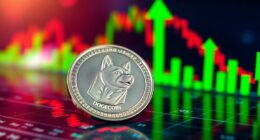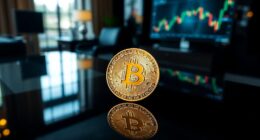Ripple's President recently highlighted that South Korea is poised for a significant institutional crypto boom. With clearer regulations and growing interest, the country could soon transform its financial landscape. This shift might attract major players and redefine digital asset adoption in the region. But what does this mean for investors and the broader market? The implications could be far-reaching, and it's worth considering the potential outcomes.

As South Korea's crypto market surges amid political turmoil, Ripple's President has expressed concerns about the rapid boom in digital assets. You might be wondering what implications this could have, especially considering Ripple's recent partnership with BDACS to enhance institutional-grade custody for XRP and RLUSD. This collaboration is particularly timely, aligning with the Financial Services Commission's (FSC) regulatory roadmap, which aims to support institutional participation in the crypto space.
You'll notice that South Korea has witnessed significant trading volumes, with platforms like Upbit processing a staggering $27.25 billion in just one day. Despite the ongoing political instability, interest in cryptocurrencies, especially XRP, remains high. Even though Bitcoin hasn't seen major outflows from South Korean exchanges, the market's dynamics have shifted, leading to a negative kimchi premium. This shift indicates that investors are grappling with viewing cryptocurrencies as safe-haven assets during such turbulent times. Political unrest has severely impacted the South Korean won, causing a drop in value, and the new Bitcoin holders are increasingly influencing market trends, which could add to the volatility.
Ripple's emphasis on institutional-grade custody technology is crucial for fostering enterprise adoption. By building an institutional DeFi ecosystem on the XRP Ledger, Ripple is setting the stage for a more secure and compliant digital asset environment. Their roadmap includes a permissioned decentralized exchange and a credit-based DeFi lending protocol, enhancing the usability of RLUSD and supporting XRPL developers.
Ripple's focus on institutional-grade custody technology is key to advancing enterprise adoption and creating a secure digital asset ecosystem.
This strategic positioning is vital, especially within the FSC's regulatory framework, as it not only boosts Ripple's credibility but also strengthens the entire ecosystem in South Korea. You should also consider how the regulatory environment plays a significant role in this scenario. The FSC's clear guidelines are essential for the growth of crypto services, and Ripple's partnership with BDACS underscores this commitment to compliance.
By adhering to these regulations, Ripple is helping pave the way for broader institutional adoption, which could lead to further expansion of the digital asset ecosystem. However, the volatility in the market caused by political events can create challenges. XRP has gained traction during this time, even outperforming Bitcoin in certain metrics.
The decline of the South Korean won has sparked increased interest in cryptocurrencies, suggesting a growing trend where crypto could be seen as a risk-on asset. In essence, Ripple's strategic moves in South Korea position it as a key player in the evolving digital asset landscape. With the right infrastructure and regulatory compliance, you might witness an institutional crypto boom that could reshape the future of finance in the region.









